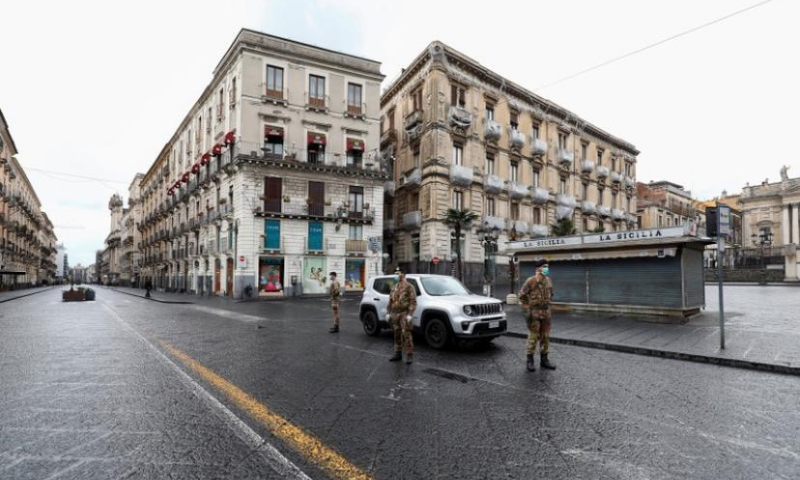MILAN: Italy reported 317 coronavirus-related deaths on Saturday against 380 the day before, the health ministry said, while the daily tally of new infections fell to 26,062 from 26,824 the day before.
Some 372,944 tests for Covid-19 were carried out in the past day, compared with a previous 369,636, the health ministry said.
Italy on Friday announced tough new restrictions in much of the country, with Prime Minister Mario Draghi warning it faced “a new wave” of infections. Schools, restaurants, shops and museums were ordered to close across most regions of Italy, including Rome and Milan from next week.
Disneyland Paris, one of Europe’s biggest tourist attractions, said it will not be able to reopen as planned on April 2 as infections remain stubbornly high in France.
The country reports 317 coronavirus deaths, 26,062 new cases
Italy has registered 101,881 deaths linked to Covid-19 since its outbreak emerged in February last year, the second-highest toll in Europe after Britain and the seventh-highest in the world. The country has reported 3.2 million cases to date.
Patients in hospital with Covid-19 — not including those in intensive care — stood at 24,153 on Saturday, up from 23,656 a day earlier.
There were 270 new admissions to intensive care units, up from 226 on Friday. The total number of intensive care patients increased to 2,982 from a previous 2,914.
When Italy’s second wave of the epidemic was accelerating quickly in the first half of November, hospital admissions were rising by about 1,000 per day, while intensive care occupancy was increasing by about 100 per day. The European Union is facing further shortfalls in its coronavirus inoculation programme after Anglo/Swedish pharmaceutical giant AstraZeneca said production problems and export restrictions would reduce planned deliveries of its vaccine.
AstraZeneca’s image has already taken a hit with several countries suspending the rollout of its vaccine over blood clot fears, even as the World Health Organisation said there was no reason to stop using it.
Denmark, Norway and Iceland have paused using the shot as a precaution and an Indian official on Saturday said the country would carry out a deeper review of its post-vaccination side effects next week.
AstraZeneca blamed production problems and export restrictions for the latest shortfall, a major setback in efforts to fight a pandemic that has claimed 2.6 million lives worldwide. The company had previously warned it was facing shortfalls from its European supply chain due to “lower-than-expected output from the production process” and was hoping to compensate in part by sourcing vaccines from its global network.
“Unfortunately, export restrictions will reduce deliveries in the first quarter, and are likely to affect deliveries in the second quarter,” it confirmed in a statement.
AstraZeneca started delivery of the vaccine to the EU in February, and still aims to deliver 100 million doses in the first half of 2021. Of this, 30 million are due to be delivered in the first quarter.
AstraZeneca had initially agreed to supply three times as many doses in the first quarter, and 180 million doses in second quarter alone.
The EU on Saturday sidestepped the issue of the number of AstraZeneca doses it was expecting. “We are aware that the company is experiencing supply issues and that discussions are on-going,” it said.
Germany has already reported adverse effects due to the delay, the state of Thuringia cancelling appointments and suspending a pilot project for general practitioners to administer the vaccine.
Thuringia had been due to receive 31,200 doses next week, but the number has been reduced to 9,600.
The state’s health minister, Heike Werner, called the delay “absolutely unacceptable”.
French Prime Minister Jean Castex said his government still expected to exceed a target of 10 million vaccinated by April 15, though he deplored that some labs were not respecting delivery deadlines.
Castex defended the use of the AstraZeneca jab despite precautions taken by other nations.
“I would not allow myself to send poison to my fellow citizens,” he said during a visit to a vaccination centre. The United States has ramped up its vaccination programme after a shaky start.
